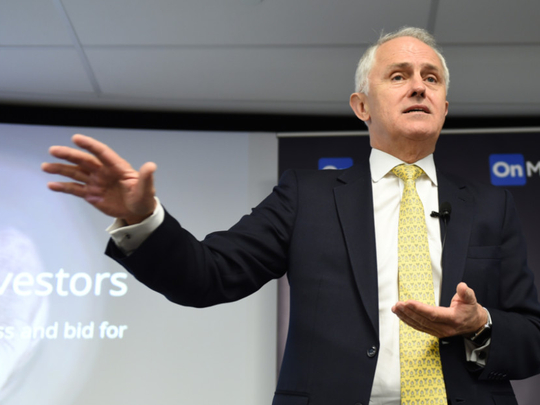
No doubt it will soon make a comeback, but for now, the “reform is stuck” trope has descended into an unedifying and largely evidence-free “debate” over penalty rates. It’s hard to see an attack on casual workers as the beginning of an era of stupendous innovation and agility, but it’s early days for Australian Prime Minister Malcolm Turnbull. The big question raised by the revolving door prime ministership is whether his leadership will endure.
Tony Abbott’s manifest unpopularity, arguable disinterest in economic policy and inability to communicate other than in slogans were not just causes of his downfall but also labelled by media and business elites as barriers to “reform”. Caught up in this febrile discourse was also the alleged ungovernability of the electorate , a panic that peaked around the time of Campbell Newman’s ouster as Queensland premier in January.
Turnbull’s ascension to the top has been greeted with relief and joy by those advocates of constant reform who feel that only “stability” in the political system can lay the path for a rerun of the neoliberal restructuring of society and economy. What if, though, causes are in fact symptoms? A long time ago, at the end of the Hawke-Keating era now lauded for its reformist courage, John Howard promised to make us all “relaxed and comfortable”.
It wasn’t just a corrective to Paul Keating’s combative style but also a recognition that the losers of globalisation were revolting (witness Pauline Hanson) and that measures like privatisation were deeply unpopular. Howard later forgot all this, but it’s worth our remembering. At the same time, and indeed earlier in the 1990s, the party system reflected social shifts by beginning the fracturing that is now accelerating. Think the rise and fall of the Democrats, the defection of Bob Katter from the Nationals, the rise of the Greens, One Nation and the declining share of the vote the two major parties attracted.
Bob Hawke, and for a time John Howard, were probably the last two prime ministers who could lead their parties without having to choose to ignore or downplay one or other of their constituent social bases. Paul Keating alienated the blue collar working class, Kevin Rudd tried to rise above it all and Julia Gillard attempted unsuccessfully to reinvent “Laborism” by adopting a trade union agenda. Tony Abbott governed for the rather tiny segment of the population that are combative cultural conservatives.
Turnbull is not just a rebadged Tony Abbott riding on public transport and speaking in longer sentences, and the Turnbull government will not be the last year of the Abbott regime, no matter what talkback radio hosts, Andrew Bolt and Labor may claim. But his task may not be as simple as convincing conservative forces within and without the Liberals that a turn to the centre is the only sane electoral logic.
For in truth, there is no “stable” centre. Just look at the Senate crossbench. Is Ricky Muir left or right? David Leyonhelm, while being ideologically consistent appears left on some issues (eg civil liberties and marriage equality) and right on others (eg taxation). The Labor party is having increasing difficulty holding onto the cultural intellegentsia, while the Greens — to the mind of some — are tacking right.
And then there’s the increasing desire of citizens to speak up and to reason publicly, also a factor in Abbott’s Apocalypse, and not reducible to simplistic nostrums about the “Twitterati”. Who would want to be prime minister in such interesting times? Whether Turnbull can prosecute the neoliberal reform agenda is moot; but it’s worth noting that the business lobbies and economic journalists are also noise machines who can help to withdraw the electorate’s confidence from a prime minister.
What Australia really needs is a more rational party system that better reflects where we all are at, and much more responsiveness and bottom-up governance. That may not bring about stability, but hope and sanity are probably more what our politics needs now.
— Guardian News & Media Ltd
Dr Mark Bahnisch is a sociologist, writer and consultant. He founded the popular progressive blog Larvatus Prodeo, and has analysed Australian politics across a variety of media since 2004. His new book is Everything You Need to Know About Queensland But Were Afraid to Ask. He is also blog editor of the Australian Sociological Association.








